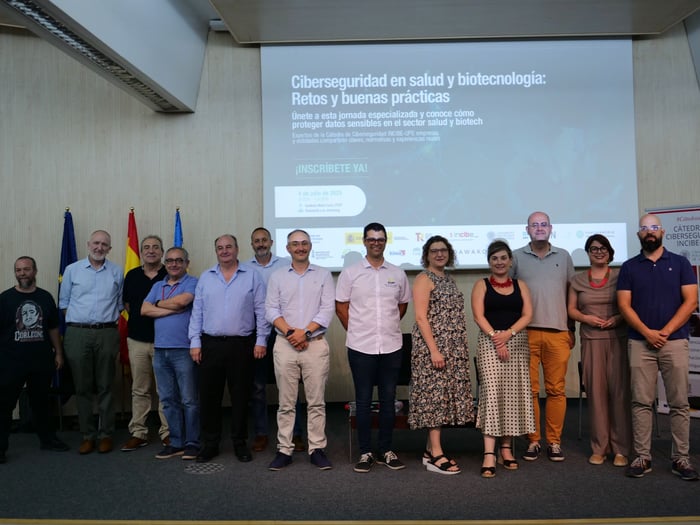The University of Valencia Science Park Foundation (FPCUV) will hold on 31 October the "Cybersecurity and Artificial Intelligence" day, a meeting at which it will discuss how to protect innovation, Sensitive data and critical systems in a scenario where artificial intelligence expands both digital opportunities and risks
The session will bring together professionals, companies and institutions to analyze the main challenges in digital protection and share real cases and good practices in implementing effective cybersecurity strategies.
The event is organized by the INCIBE-UPV Cybersecurity Chair, within the Spanish Cybersecurity Chairs program and within the framework of the Recovery, Transformation and Resilience Plan, funded by the Next Generation EU Funds, in collaboration with the University of Valencia Science Park Foundation (FPCUV). The conference will be held at the Marie Curie Auditorium of the Science Park of the Universitat de València, and can also be followed live through the YouTube channel of the Science Park.
The session will cover key policy frameworks, practical experiences and the growing role of artificial intelligence in threat detection, risk management and digital resilience. The program is aimed at managers of information systems, compliance and security, technology companies and consultants, research staff, startups and innovative entities, as well as students and teachers in engineering, informatics and related areas.











The institutional opening will be carried out by Pedro Carrasco, director of the University of Valencia Science Park, and will have an inaugural lecture by Santiago Escobar, director of the Chair of Cybersecurity INCIBE-UPV. Next, a round table on standards and regulations will bring together Jorge Edo (Mobiliza Consulting/Academy), Ángel Martín (DNV), Ana Marzo (Equipo Marzo) and Santiago Escobar (INCIBE-UPV Chair).
"This is an essential meeting to understand how to protect innovation, sensitive data and critical systems in a context where artificial intelligence expands both opportunities and risks in cybersecurity", Mariano Serra, coordinator of the conference and responsible for the area of ICT systems of the FPCUV
The second part of the program will include a panel discussion on practical cases of application of AI in cybersecurity, with the participation of Helena Burriel (IFIC, UV-CSIC), Juan Manuel Heras Gómez (Nunsys), Silvia Rueda (ETSE-UV), Xavier González del Águila (Grupo Oesía), José Francisco Cubells (Lãberit), Raúl Hussein (ITI) and Ramiro del Pulgar (PECB). The meeting will conclude with a networking session to encourage the connection between agents of the innovative ecosystem.
According to Mariano Serra, coordinator of the conference and responsible for the area of ICT systems of the FPCUV, "this is an essential meeting to understand how to protect innovation, sensitive data and critical systems in a context where artificial intelligence expands both opportunities and risks in cybersecurity".
For his part, Pedro Carrasco, director of the University of Valencia Science Park, highlights that this appointment "consolidates the commitment of the Park to innovation and digital security. Following the conference held in June on cybersecurity in health and biotechnology, we continue to promote dialogue spaces that help anticipate emerging threats and strengthen collaboration between administrations, companies and research staff".
 Jornada de Ciberseguridad en el Sector Salud y Biotecnología celebrada el pasado julio en el Parc Científic UV. Foto: FPCUV
Jornada de Ciberseguridad en el Sector Salud y Biotecnología celebrada el pasado julio en el Parc Científic UV. Foto: FPCUV
A double-edged relationship
The application of artificial intelligence in cybersecurity is transforming how organizations protect themselves from digital attacks. According to the World Economic Forum’s Global Cybersecurity Outlook 2025, AI is accelerating incident detection and response, but it is also being used by cybercriminals to create more sophisticated and automated threats.
Deloitte and Darktrace reports agree that more than 90% of companies believe AI improves the speed and effectiveness of their defense strategies, although 45% of professionals acknowledge that they are not prepared to deal with attacks driven by their own artificial intelligence. Major emerging risks include AI-generated attacks, the use of models manipulated by false data and excessive reliance on automated systems without human supervision.
In this context, training, public-private partnership and awareness raising are key. As international cybersecurity agencies point out, the threats of the future will require human teams capable of understanding, auditing and governing AI tools.
With initiatives such as this day, the FPCUV and the INCIBE-UPV Chair contribute to that objective: generate knowledge, strengthen alliances and prepare the research, business and academic community for the challenges of increasingly intelligent cybersecurity.
Relive the Day on Cybersecurity in the Health and Biotectology Sector
Cybersecurity Chair Program in Spain
INCIBE, within the Global Security Innovation Program, has as its particular mission the raising of capacities and resources in cybersecurity, in the academic, business and technological ecosystems, aimed at boosting the cybersecurity capabilities of society and the economy in general. This initiative aims to have a program that pursues the promotion and generation of knowledge and its transfer to the productive sector, especially by establishing synergies between the social and economic areas of cybersecurity. With the objective of developing this purpose, the public invitation for collaboration in the promotion of cybersecurity chairs in Spain was launched on 1 December 2022.
The initiatives and actions of the Cybersecurity Chairs program in Spain are included in the Global Security Innovation Program, contemplated in the Recovery, Transformation and Resilience Plan (PRTR) through Component 15. Investment 7 Cybersecurity: Strengthening the capacities of citizens, SMEs and professionals and boosting the sector. It is particularly active in three of the six key aspects of industry listed in PRTR milestone 245: boosting the national cybersecurity industry for the emergence, growth and development of enterprises in this sector; to develop high value-added solutions and services in the field of cybersecurity; and to train and develop specialised talents in the field of cybersecurity.
About INCIBE
The National Institute of Cybersecurity is an entity under the Ministry for Digital Transformation and the Civil Service, through the Secretariat of State for Telecommunications and Digital Infrastructures, consolidated as a reference entity for the development of cybersecurity and digital trust of citizens and businesses. It is also an engine of social transformation and opportunity for innovation, fostering R&D&I and talent.
About UPV
The Polytechnic University of Valencia (UPV) is, according to the Academic Ranking of World Universities (ARWU), known as the ranking of Shanghai, the best technological university in Spain. More than 70% of UPV students work within a year of completing their studies. This is largely due to paid work placements. The UPV has more than 1,000 student exchange agreements with other universities in Europe, Latin America, the United States, Canada, Australia, China and Japan. In just over 50 years of history, it has produced more than 145,000 scientific publications. It is a national leader in the number of patents and one of the most profitable academic institutions in Spain thanks to its research activity.
About FPCUV
The University of Valencia Science Park Foundation (FPCUV) is the entity that manages the business area of the University of Valencia Science Park, and provides high added value services to more than a hundred companies located in the Innovation ecosystem of the Science Park, Working together to improve their competitiveness through transfer, innovation and internationalisation, among other functions. The FPCUV is also responsible for ensuring, according to efficiency and sustainability criteria, the proper functioning of the facilities and services of the Science Park. Since the beginning of its activity, the Foundation has hosted more than 260 companies, among which those dedicated to Advanced Services, Biotechnology and ICT have a high specific weight.
Recent Posts


